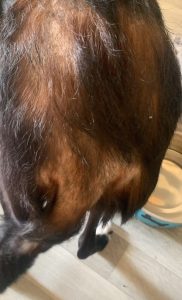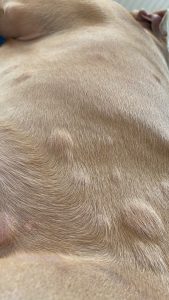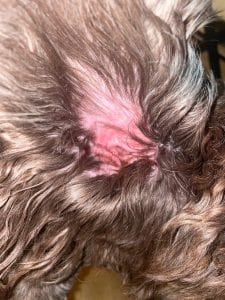Signs of being itchy and skin disease account for up to 40% of vet visits for dogs. There are many different problems that may cause your dog to itch.
Some conditions are more common in different breeds or at different ages. Depending on the cause and condition, dogs may need lifelong treatment. If your dog becomes itchy, consult a vet for advice as soon as possible. If left untreated, itching can worsen and lead to severe self-trauma, hair loss, and skin infections.
What to do
What to do if your dog is itchy
Depending on how severe the signs are, different treatment options may be available.
- Mild itching is when the itch occurs only occasionally. This can often be treated at home, depending on the cause. Skin supplements, diet changes, parasite control, and topical skin treatments can all be useful. Our Joii vets are available 24 hours a day for advice.
- Moderate or severe itching occurs when your dog is constantly scratching. They will stop what they are doing, such as eating or playing, to itch themselves. This often requires prescription medication to resolve the symptoms. Contact your local veterinarian for an appointment as soon as possible.

Causes
The most common causes of itching in dogs
Many different things can cause your dog to itch. Click on the links to explore each cause in more detail.
Allergies
Allergies are the most common cause of itching in dogs and can be split into different categories
- Flea allergy dermatitis: a skin infection caused by flea bites
- Food allergies: an allergy to something in their food, usually the protein source (such as chicken or beef)
- Seasonal or environmental allergies, also known as atopy. Includes allergies to pollen, dust mites, grass, and mould.
- An allergic reaction: sudden in appearance, and often see bumps all over the skin. Also known as urticaria or hives.
- Contact allergies: caused by direct contact, such as with plastic food bowls.
Parasites
- Fleas
- Mites: Demodex and Sarcoptes (Mange), Ear mites in dogs, harvest mites
Skin infections
These are often secondary to allergies or parasites.
- Bacterial, yeast, or fungal
- Hot spots: a localised infection of the skin. Appear as moist and red patches of skin and can be swollen. More common in summer.
- Ear disease: most often related to allergies. Can also be due to foreign bodies, ear mites, or a mass in the ear.
- Ringworm
Others causes
- Anal gland disease, such as infections or abscesses
- Pain: often when it is localised to a specific area. Can cause dogs to chew or bite at an area of skin. Includes acute pain, such as wounds, and long-term pain, such as arthritis.
When to worry
When to worry about your itchy dog
Seek help from a vet if:
- Your dog is constantly itching throughout the day.
- Your dog develops any severe skin lesions, or they are widespread over the body.
- Your dog is unwell as well as itchy.
- Your dog has a sudden allergic reaction with breathing problems.
Joii can help if:
- Your dog has a mild itch or has started scratching their ears.
- Your dog has small or localised skin issues.
- You have questions about what skin supplements or ear cleaners are best to use.
- You have questions about the best parasite control for dogs.
- You have any questions about food allergies or how to do a diet trial.
Prevention
Tips on how to prevent your dog from itching
- Use regular parasite control that covers fleas, mites, ticks, and worms.
- Regularly clean your dog’s bedding, collar, and bowls.
- Dust and vacuum the house often, and avoid sprays or perfumes in the house.
- Brush your dog and check for any abnormal areas of skin at least once a week.
- Feed your dog high-quality, complete food for their age and lifestyle. Some brands also have a special skin care range with high omega oil levels.
- Skin supplements containing omega oils are useful for dogs with skin diseases.
- Dust mite spray for the house is useful for dogs with these allergies.
- Some dogs benefit from regular bathing, shampooing, and ear cleaning. Follow professional advice for this, as bathing too often can also cause problems.
- Get your dog checked over with a vet as soon as possible if they become itchy to help prevent self-trauma to the skin.
Diagnosis
How to know if your dog is itchy
The medical term for itching is pruritus. It may not always be obvious that your dog is itchy. Some dogs will secretly scratch or show other signs of being itchy, such as chewing, biting, rubbing, and licking.
You may notice skin lesions, such as:
- Hair loss or bald patches
- Pink or red skin
- Dark or thickened skin
- Scabs, dry skin, a rash, hives, blisters, or black spots
- Bleeding skin from self-trauma
- Saliva staining on the paws
- Dandruff and flakes
- Lumps and swellings

- Hair loss is a common symptom

- Saliva staining makes the paws look red or brown

- A dog with hives
Different body parts may be affected, such as
- Ears: itchy, red, discharge (including wax), smelly, swollen, shaking head
- Eyes: itchy, weepy, red, holding them closed
- Runny nose and Sneezing
- Paws/feet: itchy, swelling, lumps, red skin
- Tail and bum: itchy skin, scooting, swelling, lumps

- Dog with red inflamed ears
Your dog may show other signs, such as Vomiting, Diarrhoea, weight loss, Pain, or lethargy. Speak to a vet as soon as possible if they are ill as well as being itchy. Our Joii team are available 24 hours a day for advice.
Home treatment
How to treat an itchy dog at home
It’s always best to seek the advice of a vet if your dog shows signs of being itchy. Home remedies may be helpful for certain conditions, and your vet can guide you on the best ones to look for. Our Joii vets are available 24 hours a day for any questions.
Allergies, in particular, can be tricky to treat, and it’s recommended to take a multi-modal approach. This means using different products and methods to improve the signs.
- Use a buster collar, inflatable collar, or medical pet suit to prevent further self-trauma.
- Calming or medicated shampoos, mousses, wipes, and gels are useful for certain conditions, including mild skin infections. These are often antibacterial and also soothe the skin.
- Some ear cleaners can also help with mild irritations or infections.
- Speak to a vet before using any of these home remedies, such as olive oil, apple cider vinegar, or coconut oil. These have limited research in dogs and may be more harmful for some conditions.
- Make sure your dog is up to date on parasite control.
- Feed a good quality, complete diet. Hill’s Prescription Diet Derm Complete is useful for a range of conditions that can cause your dog to be itchy. It is proven to help with both food and environmental allergies.
Allergies
- For mild itching, skin supplements containing omega oils can help protect the skin barrier.
- A diet trial with a novel or hydrolysed protein to check for food allergies. A novel protein is one that your dog has never eaten before. A strict trial lasting 6-8 weeks before assessing the results; cut out all other food and treats.
- Make sure all pets in the household are up to date on parasite control that covers at least fleas and mites.
- If your dog has specific allergies, try to avoid contact with them. For example, avoid walking when the pollen count is high, avoid long grass, dust regularly, and feed certain foods.
Other causes
- Follow the links to see at home treatment for the following:
- Parasites
- Ringworm
- Anal Gland Disease
- Pain
- Wounds
Vet treatment
Vet treatment for itchy dogs
Your dog might need prescription medication from your local vet. This usually involves a full physical examination to assess the skin, ears, and all other body parts.
Prescription medications include:
- Anti-itch medications: there are many different types of these, and your vet will work with you to find the best solution for your dog. Includes steroids, Apoquel, Atopica and Cytopoint.
- Allergen-specific Immunotherapy: A medication made specifically for each patient based on the results of skin or blood tests for allergies. Helps to desensitise the body to different allergens. It works to reduce the severity of the symptoms of allergies and is usually given by injection every 2-4 weeks.
- Anti-inflammatories: NSAIDs (non-steroidal anti-inflammatory medications). Often used for anal gland disease and treatment of pain.
- Antihistamines: such as Clorphenamine or Loratadine
- Parasite treatments: for fleas and different types of mites
- Antibiotics: many different forms, such as tablets, liquids, injections, creams, or shampoo
- Antifungal medication
Other tests to diagnose certain conditions:
- Skin scrapes, hair plucks, or biopsy
- Ear or anal gland flush and swab
- Blood and urine tests
- Intradermal skin testing for allergies
- A strict food trial to check for allergies in the food
- Imaging, including x-rays, is usually done if pain is suspected
Risk
Are some dogs more at risk of becoming itchy?
Allergies
Atopy/environmental
- Breeds: English and French Bulldogs, Bull Terriers, Labrador Retrievers, Spaniels, Poodles, West Highland White Terriers, and Shar Peis.
- Ages: usually begin in young adults
Food allergies
- Can occur at any age but are more common when less than 1 year old.
- Some breeds may be more at risk, including West Highland White Terriers, Cocker Spaniels, and Irish Terriers.
Ear disease
- Breeds: Cavalier King Charles Spaniel, Springer Spaniel, Cocker Spaniel, Retrievers, Poodles, Pugs, and French Bulldogs.
- Dogs that like to swim can be at higher risk of ear infections.
- Ear disease is often associated with an underlying allergy.
Anal gland disease
- Breeds: All dogs can develop anal gland problems, but they are more common in small breeds such as Cavalier King Charles Spaniels, Cocker Spaniels, Bichon Frises, and Shih Tzus.
- An inadequate diet, soft stools, obesity, and allergies can also lead to anal gland disease.
Mange
- Dogs with weaker immune systems are more at risk. This includes dogs that are elderly, very young, or have other underlying health issues, such as diabetes or cancer.
- Some breeds have an increased risk of demodex. These include Shar-Pei, Shih Tzu, West Highland White Terrier, Pug, Boxer, Border Terrier, and Bull breeds.
Hot spots
- Any dog can develop a hot spot, but they are more common in long-haired breeds, such as German Shepherds, and Golden Retrievers.
Other causes of itching in dogs
Stress: Dogs that are stressed may also show signs of biting or chewing
Ticks: don’t tend to be itchy but can cause skin reactions
Lice: not common in dogs. Can be easily prevented with most routine parasite control.
Pemphigus Foliaceus: the most common auto-immune disease in dogs. The body’s own immune system attacks the skin cells. More common in middle-aged and older dogs. Certain breeds may be more susceptible.
Anal furunculosis: a chronic inflammatory disease involving the anus.
Sign up for the Itchy Dog Study today
If you are concerned about your puppy or dog being itchy, then why not sign up to our Itchy Dog Study? Registration takes only a few minutes. Should you and your dog be a suitable duo, you’ll become part of a special food trial to help many four-legged friends. Benefits include free food, pet care and a £150 Amazon voucher. Get involved using the button below.








